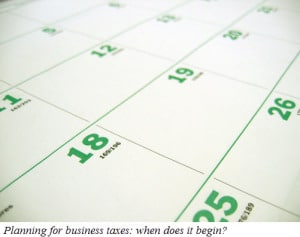When is the Best Time for Business Tax Planning?
While some business owners have forms to file and payments to fulfill throughout the year, they may not know the best time of year to actually plan for business-related taxes. Here are our suggestions for companies of all sizes: from the self-employed individual to the large corporation.
For most businesses, the best time to plan for corporate taxes is during the last quarter of the calendar year, starting in October. And while we’re already in November, it’s not too late to get started. This not only allows for enough time to make adjustments based on the company’s financial situation for the past year, but also enables business owners to consider which new tax laws are going to affect them in the coming year…and to prepare for it.
For example, in 2014, the maximum credit for small businesses that pay insurance premiums on behalf of their employees increased; so employers may get a refund of up to 50 percent of the premiums paid (35 percent for small tax-exempt employers).
On another note, in 2013, a special bonus depreciation deduction allowed businesses to deduct half the cost of new equipment; however, this provision does not apply for 2014. Companies that previously used this deduction will no longer be able to do so for their 2014 taxes.
There are other steps to take before tax time, including deciding when to pay certain business costs and when to receive payments from clients. For business expenses – such as travel, education, and gifts – that can be deducted in 2014, it may be wise to spend the money before the end of the year. If the business can handle it, paying as many operating costs before the end of the year can sometimes be a strategy to managing a company’s taxable income.
What about extra cash in the bank? For some business types, it can be beneficial to use it toward employee bonuses. In addition to the increased employee morale that a bonus payment brings during the holiday season, it can be another strategy to managing taxable income for the business.
Talk to a Professional Tax Accountant
If companies are going to have additional financial obligations to their corporate taxes only a few months from now, it is to their advantage to have extra time to come up with the funds to maintain a good standing with the IRS. A professional tax accountant understands the provisions and restrictions of current tax law, and can help businesses navigate these updates.
To obtain a referral to an experienced business tax accountant, please contact Brooks Business Services. We work with a number of excellent providers who can help.








